Obsidian Memo] A Soul-Marker Moment: Reflections on Leadership, AI, and the Future of Finance in Unprecedented Times (reason for a hope) - Barack Obama at O2 in London
Personal Essay: After Obama’s talk at the O2 in London (Sep 24, 2025), I felt a profound exhale. His steady leadership on AI, capitalism & institutional change reaffirmed my impact and sustainable finance work. Reflections on belonging, responsibility, and the future.
![Obsidian Memo] A Soul-Marker Moment: Reflections on Leadership, AI, and the Future of Finance in Unprecedented Times (reason for a hope) - Barack Obama at O2 in London](/content/images/size/w1200/2025/09/WhatsApp-Image-2025-09-25-at-07.50.37_823e0b08-3-1.jpg)
*This is not a political post.
💯Key Takeaways for busy investors and leaders
On September 24th, we joined 14,000 people at the O2 Arena in London to hear Barack Obama speak. As we stepped into the space, Beyoncé’s I Was Here played overhead. The atmosphere was buoyant, intimate, and unexpectedly personal. For me, it wasn’t just another event; it was a reminder of why leadership matters—and why the future of finance, sustainability, and systems change must be anchored in both wisdom and humanity. Kindness and Grace. On a personal note, it was also a moment of exhale, welcoming my president on UK soil, which gave me full permission to bring out my goofy American side.
Three Insights
1. We live in unprecedented times—and that’s okay: Obama reminded us that capitalism, democracy, and even constitutions are still experiments. In other words, the systems we often treat as immutable laws of nature are, in fact, designed and re-designed by people. They are human constructs. For me, as an investor in sustainable finance, this is liberating: markets and systems are not fixed laws of nature. They are tools. The question is not whether capitalism is perfect, but how we direct its power—to benefit all, not just some.
2. Pandora’s box is open: AI will reshape jobs and value creation: Obama spoke candidly about the coming wave of artificial intelligence. There is, in his words, a slim but non-zero chance of humanity “bowing to AI as masters.” The more likely reality is a profound restructuring of work and value creation. Millions of jobs—white and blue collar—will be reshaped within the next 5–10 years (2 years in my view, according to various Silicon Valley AI builders). For capital allocators, this is not a side note. It is a systemic shift in how value is created. We need to ask: how do we invest in a world where traditional employment is no longer the anchor of the economy?
3. Society is like a "grandpa"- it has memory and momentum: Obama likened society to a grandfather—resistant to change, full of its own memories, history, and habits. I have witnessed this dynamic inside large institutions and governments: information and capital can move quickly, yet legacy behaviors endure. True leadership is not about imposing utopia overnight but working with what exists, while slowly reshaping it.
- True leadership is simplicity, clarity, and grace in the face of complexity.
*This is a very long, personal reflection and essay - full version
Hi All,
Have you ever had that feeling? In the midst of uncertainty, out on the ocean, you wait — waiting for a sign. Then you finally see a light flickering in the distance. A big exhale.
Today, I want to talk about something very personal and share my reflections after attending Obama's talk. As soon as I stepped into the O2 Arena at 6:45 pm and saw the stage with Barack Obama's name on it, chills ran through my body, and I got emotional. I was still jet-lagged, but something in me perked up. People were still arriving after work. The room felt buoyant yet calm—gentle, cozy, warm, and unexpectedly intimate. I was surprised that something on that scale could feel so personal. It was such a contrast to eight years ago, when I first visited the O2 from the Barclays corporate box, new to London from NYC, and still finding my footing. This time, I was there to welcome my president on UK soil!
As we waited for his arrival, Beyoncé's "I Was Here" played in the background—my favorite, as she once performed it at the UN. I teared up. A dose of American hope was injected straight into me, making me feel like I was back at home. Instant UPLIFT!
Obama also joked as he entered the stage. "No music or singing? Just straight to the talk?" He meant the cultural difference between the US vs. the UK.
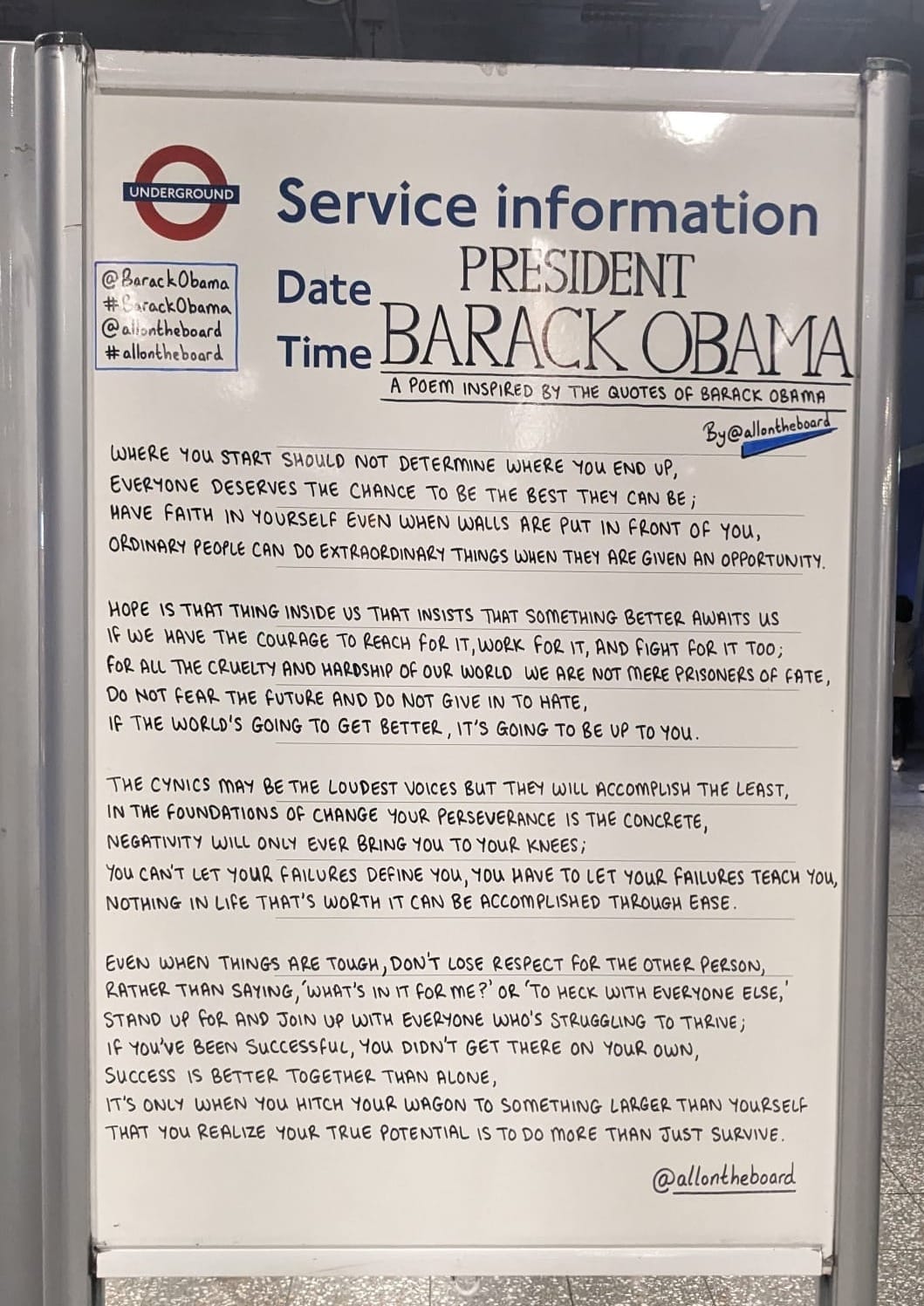
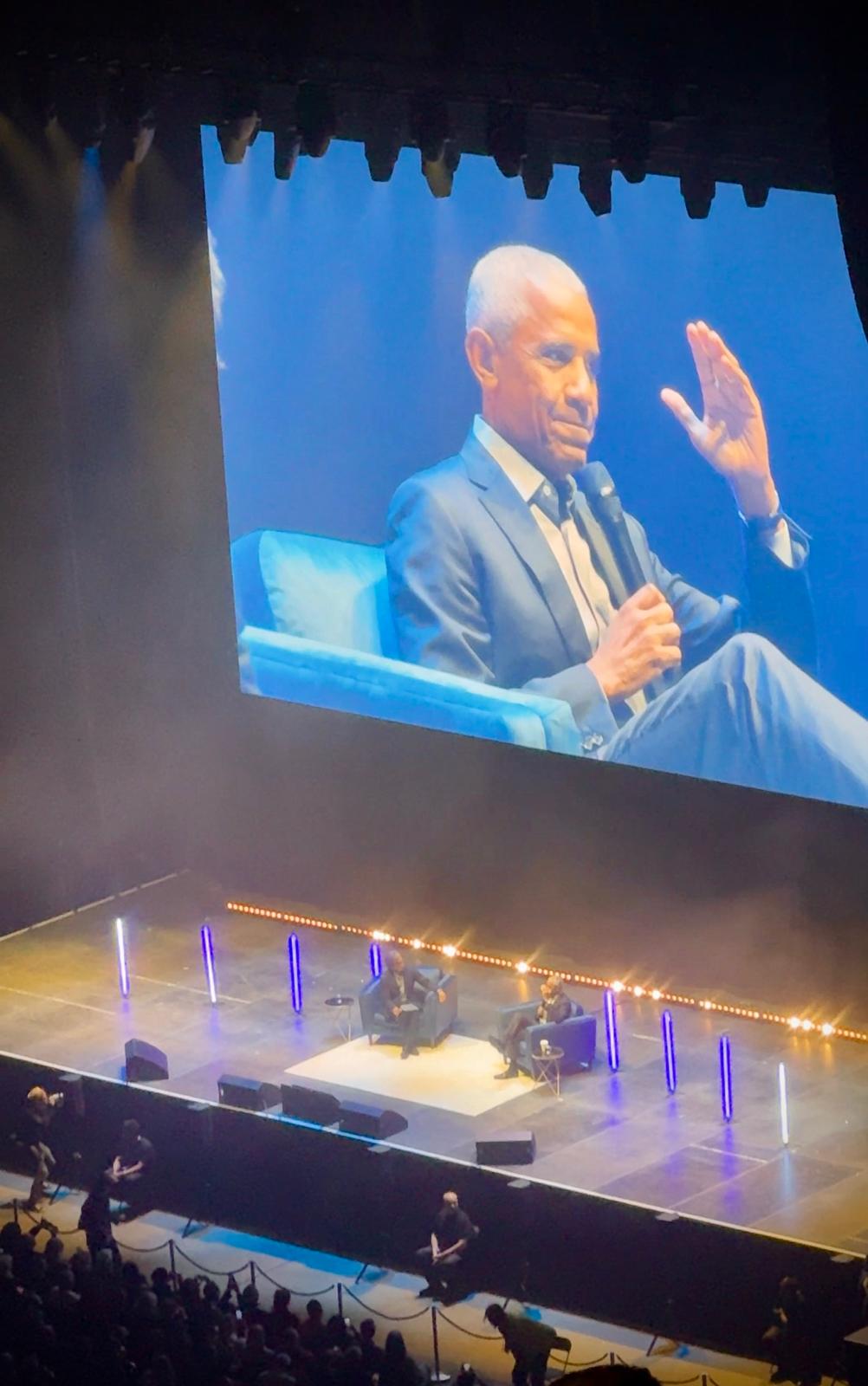
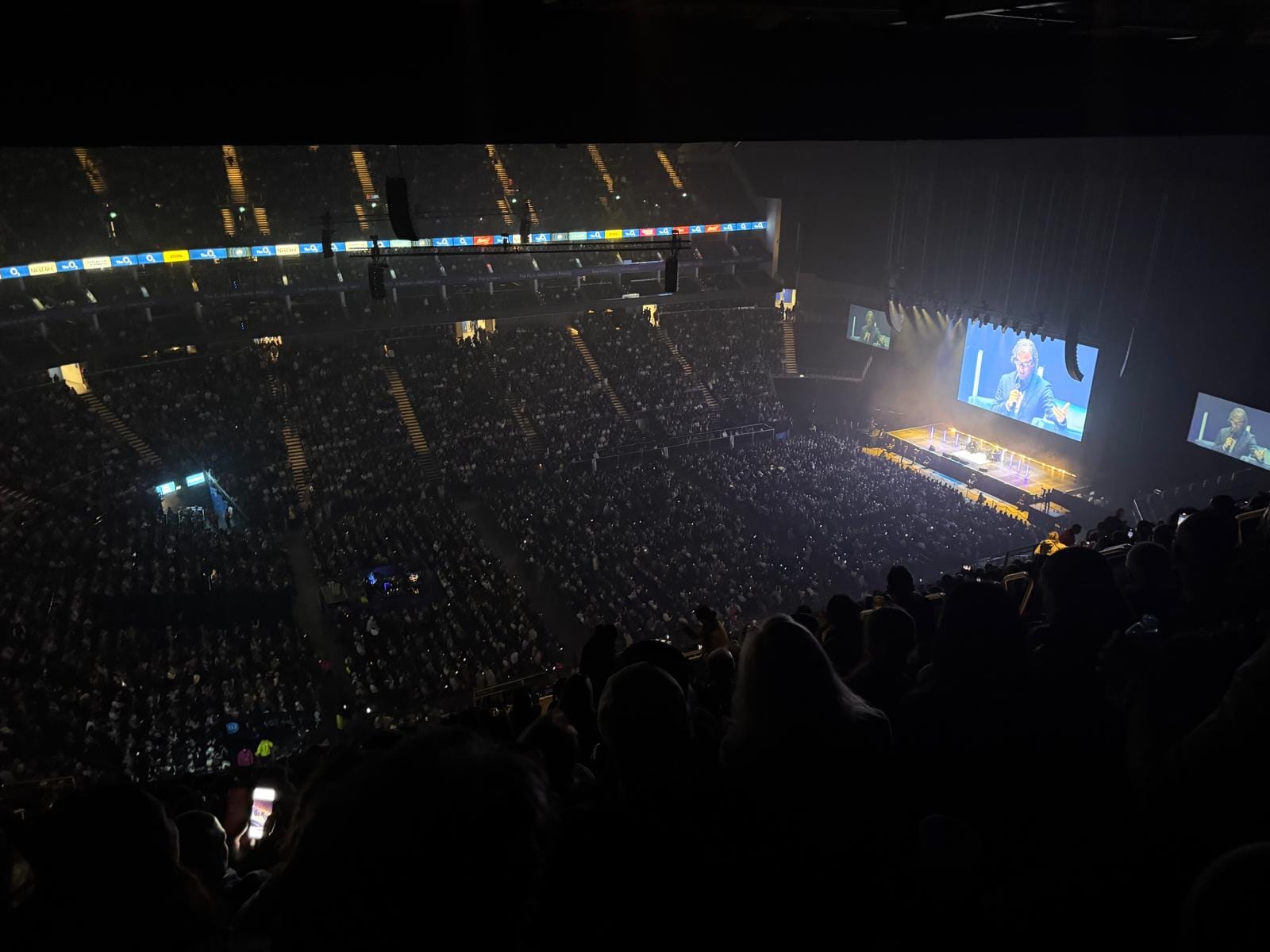
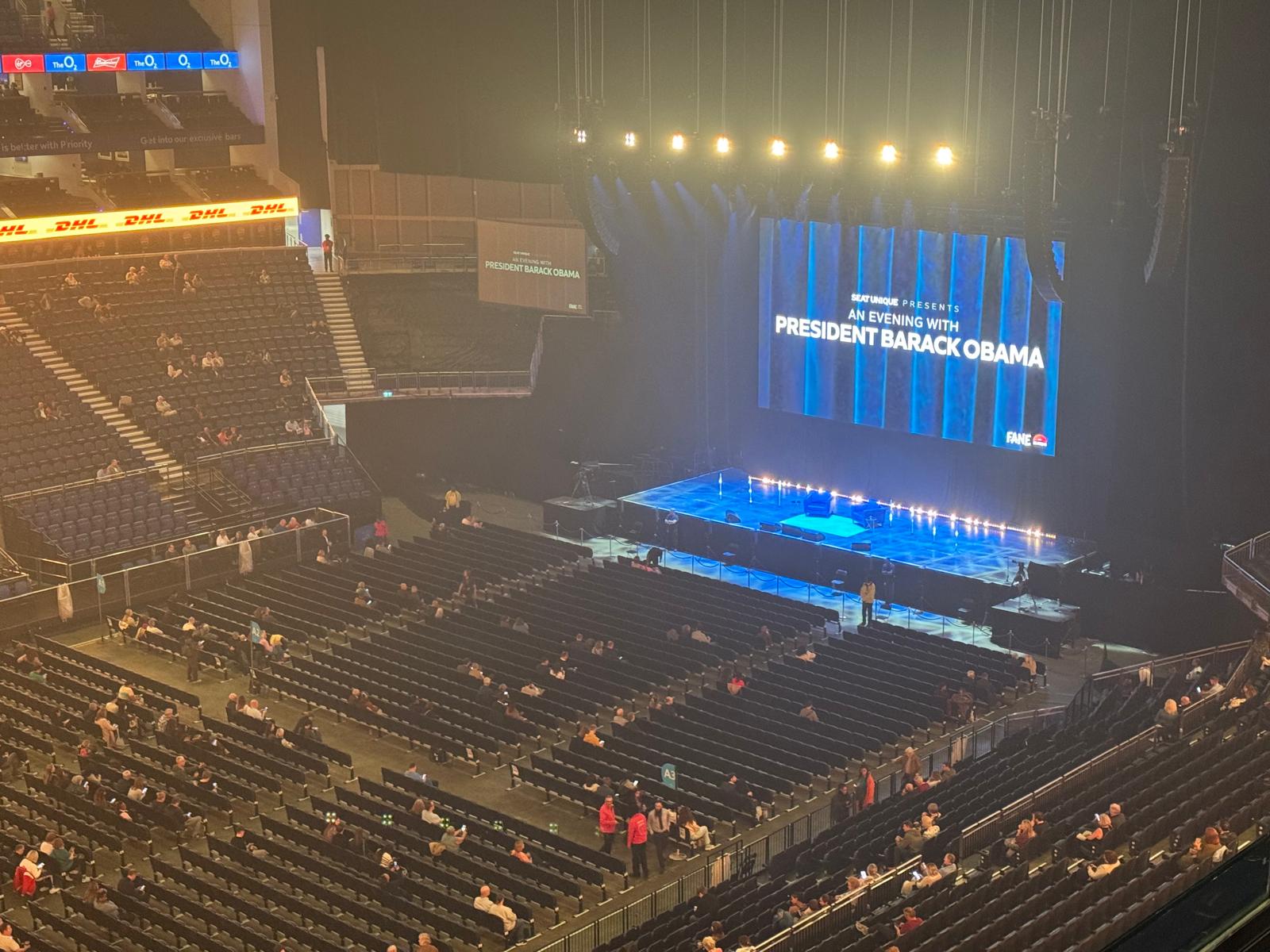
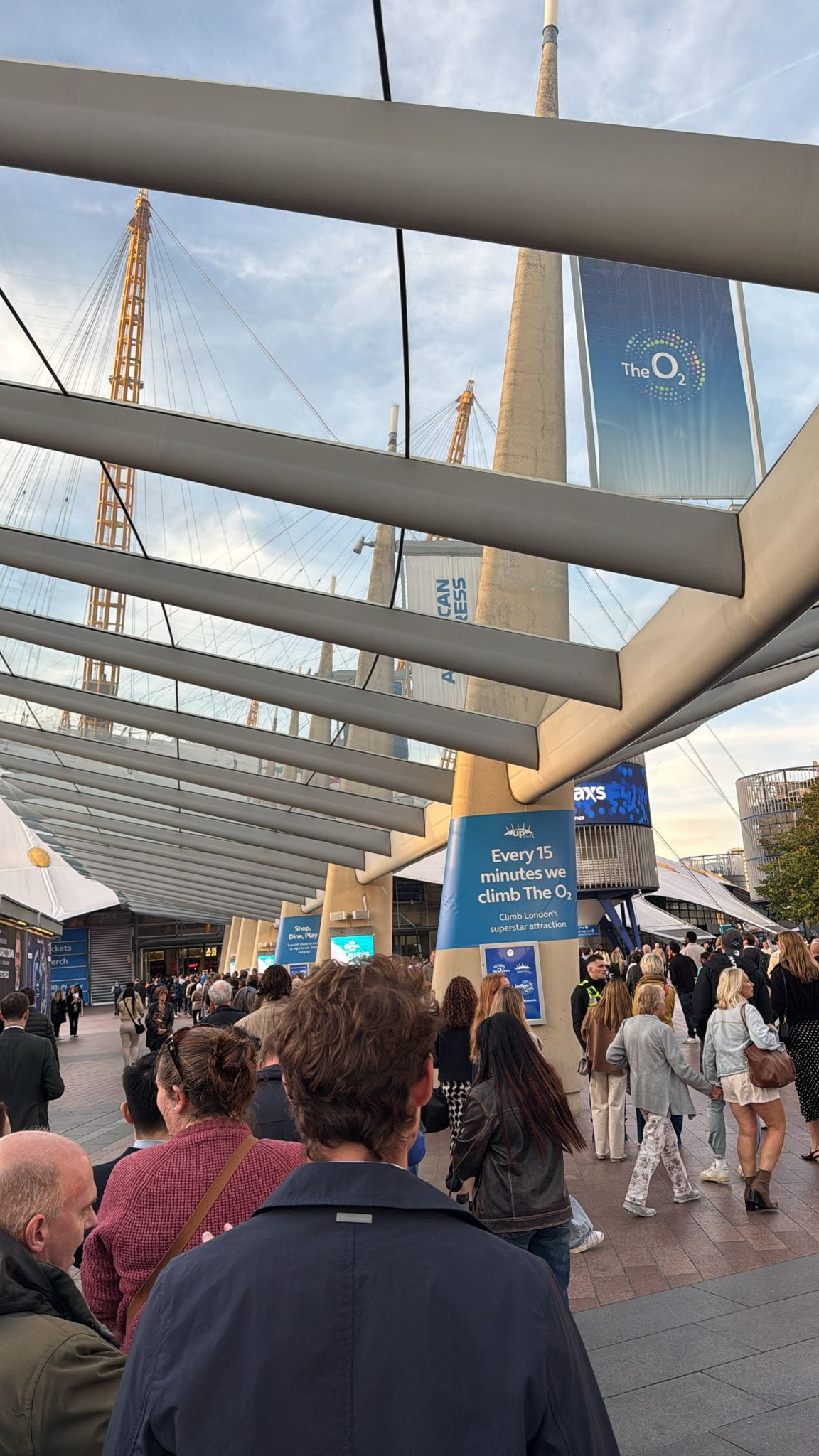
I. A Decade-Long Journey
My connection to Obama spans over a decade, woven through pivotal moments of my personal and professional life. I was a freshman at NYU when Obama won his first election—a historic moment that shook Manhattan. People didn't sleep that night. We flooded the streets, Times Square, screaming, dancing, celebrating. It felt like the Halloween parade, but charged with history and joy. The next day, one image stayed with me: professors of all cultural backgrounds smiling with hope and pride. In a crowded elevator, on our way to classes, people were exchanging their morning greetings, this historic news, and joy. New Yorkers felt like one big fat giant family that day. No strangers; only a sense of unity. We couldn't believe we were living through such a historic moment.
Right before that election, Obama came to our campus—Washington Square Park—and gave a speech. He was new. Up and coming. "There is a guy called Obama who's running for president; do you want to check him out?" My friends and I rolled out of bed (some still in gym clothes) and walked to the park, right next to our dorm, to watch him. It was one idyllic, warm afternoon in the fall, I still vividly remember; yellow leaves in the park. We didn't know much about him then, but oh boy—weren't we surprised when he won!
My admiration only grew. I watched him speak at the UN General Assembly, living and working just blocks away. When I was an analyst at BlackRock in NYC, my second-year teammates used to mock me: “Why don’t you just go to the UN instead of watching Obama’s speech on the trading-floor TV?" What they didn’t know then was that yes — I had seriously considered joining the UN before entering finance, following in the footsteps of my ancestors in diplomacy, law, and politics. But for global scale and impact, I chose finance and capitalism as a platform for change. Sometimes on lunch breaks at work or while running errands in Manhattan, I'd run into his motorcade during UN week. I would gladly stop, soaking up that energy with a smile as his car passed. He represented a hope for me. Hope for the change; global impact at scale. "YES WE CAN!"
Later, I had the privilege of working with the Obama administration on climate initiatives as part of my work in sustainable finance and ESG strategy.
Somehow, the universe kept connecting me to him, running into his state visits at the airport. And today, again, far away in the UK—sometimes feeling deflated (anyone in sustainable finance would understand this feeling today)—he gave me a lifeline of hope.
II. In the Presence of Leadership
I prepared for this evening by watching Michelle Obama's podcasts, and it was indeed inspiring to be in the presence of a LEADER—a rare commodity these days. Both Michelle and Barack became the North Stars of leadership for many. I'm not talking about their political views or personal life, but about a thoughtful leader as a human being and as a character. And here was Barack Obama. His voice. His presence. The way he carried himself, the way he chose his words, and the way he acknowledged and connected with the British audience by using British references and shouting out a salute to Sadiq Khan, the mayor of London—these details revealed a leader who understands that connection transcends borders. His simplicity and clarity in words and analogies made it easy to follow the complex global phenomenon. How can one speak so much with so little?
My friend Hannah wondered what it would feel like to go from having access to all the information in the world as the most powerful person on Earth to waking up the next day without that access. That registered something profound in me.
During my time at BlackRock for a decade, I was blown away by the sheer amount of institutional information flows and global connectivity (offices in 30+ countries and clients in 100+ countries). MASSIVE COLLECTIVE INTELLIGENCE and GLOBAL NEURAL NETWORK! With my company badge, I used to treat BlackRock offices outside the US as my first emergency contact whenever I was traveling—for work or personal reasons—even before embassies. In fact, it was often better because it was accessible 24/7, 365. Embassies have open hours; BlackRock offices never shut down. During the pandemic, it became clearer—in certain cases, the company knew more and acted faster than governments because they had branches and offices around the world. The agile adaptability was phenomenal.
Yet here was Obama, someone who once had access to the ultimate information flow, speaking with the wisdom of someone who understood both the power and the limitation of that access. From one to zero (granted, he still has better access to information than most of us average people). What struck me wasn't nostalgia for power, but his grace in navigating that transition, and also the global, macro insights that only a select few can develop having sat at the top of the throne.
He felt like a conductor in an orchestra of the world and humanity—orchestrating complex, interconnected systems with grace and intentionality.
III. Three Insights That Resonated
1. We Are Living in Unprecedented Times—And That's Okay: Obama acknowledged that we're navigating uncharted territory: geopolitics, AI, capitalism, democracy, constitutions—these are all experiments. But capitalism can be used as a force for good. As an impact investor in sustainable finance, this resonated deeply with me. The financial systems we've built aren't immutable laws of nature; they're tools we can reshape. The question isn't whether capitalism is perfect, but how we direct its power toward outcomes that benefit humanity and future generations. Not just 'some' people, but 'all' people, incl. the vulnerable.
2. Pandora's box is open. AI is coming—Society Must Prepare: We need to think about workforce rearrangement at a societal and global level next 5 - 10 years (in my view, and according to the Sillion Valley AI builders, it will be closer to 2 years in fact). Obama noted there's a very slim, yet non-zero chance of humanity bowing to AI as masters, and a higher chance that AGI will replace many white and blue-collar workers. Yet, we are not prepared for that and nobody is talking about it. He urged us to voice our thoughts and concerns as citizens and ensure we have our inputs into how AI is being developed and shaped, not just leaving it to a few who control the technology. As the first "digital president" whose campaign embraced social media, and as the most photographed, filmed, and voice-recorded person on Earth—making him perfect deepfake material—his perspective on AI carries unique weight. Having known Mark Zuckerberg for over a decade (Obama thought Zuckerberg was somebody's kid in his Birkenstocks), his remarks about technology's trajectory are worth heeding.
For those of us in capital allocation, this isn't just a technological shift—it's a fundamental restructuring of human value creation. How do we invest in a world where traditional employment models may no longer apply?
3. Society Has Memory and Momentum: Obama said society is like a grandpa—it has its own memories, resistance, and experiences that shape how it behaves. This insight cuts to the heart of institutional change. Within large institutions, I have witnessed their information flows, and I understand how organizational memory can both constrain and guide decision-making. Change doesn't happen overnight, and leaders must work within existing systems while gradually reshaping them.
This perspective is crucial for anyone working in finance, policy, or organizational change. We're not writing on blank slates; we're working with systems that have deep histories and embedded behaviors.
IV. In closing...Looking Forward
Tonight was something I'll remember forever—tattooed in my heart. An exhale moment. But more than personal nostalgia, this evening affirmed what I've been gathering from friends around the world: we are at an inflection point. We need leaders who can hold complexity, who understand that we're in uncharted territory, and who can conduct the orchestra of global change with both wisdom and humility.
Obama's presence reminded me why I do the work I do—why sustainable finance matters, why sustainable and impact strategy isn't just about compliance, and why the conversations we have about capitalism's future are so crucial. In uncertain times, we need adults in the room who can see the big picture while remaining grounded in humanity.
Kindness and Grace.
That's the kind of leader I aspire to be. That's the kind of world I want to help build for our children and future generations.
V. Question for the Obsidian Odyssey Community
What moments have shaped your understanding of leadership? I'd love to hear your thoughts.
![Obsidian Memo] Leadership Ground Truth: What Cuba, Puerto Rico, and Hawai'i Taught Me About Capital and Resilience](/content/images/size/w720/2026/02/Bad-Bunny.jpg)
![Obsidian Memo] Leadership Lessons for Founders: Building “You, Inc.” Without Burning It Down](https://images.unsplash.com/photo-1474917518260-23f84bd71c75?crop=entropy&cs=tinysrgb&fit=max&fm=jpg&ixid=M3wxMTc3M3wwfDF8c2VhcmNofDQyfHxzYWlsaW5nfGVufDB8fHx8MTc3MDkyODg3Mnww&ixlib=rb-4.1.0&q=80&w=720)
![Obsidian Memo] Davos 2026: Reflections on Geopolitics, AI, Energy, and the Future of Sustainable Capitalism](https://images.unsplash.com/photo-1551524484-635f78221cc4?crop=entropy&cs=tinysrgb&fit=max&fm=jpg&ixid=M3wxMTc3M3wwfDF8c2VhcmNofDR8fGRhdm9zfGVufDB8fHx8MTc3MDY2MTg4M3ww&ixlib=rb-4.1.0&q=80&w=720)
Comments ()